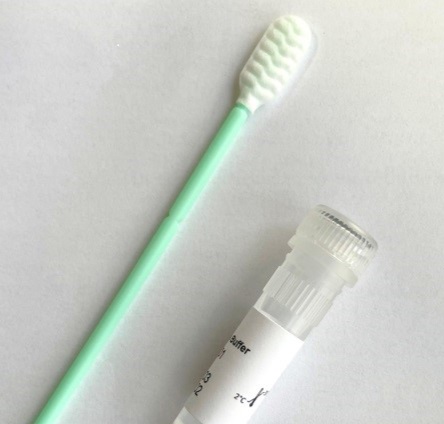Download and print as a PDF (272kB pdf)
On this page
- Why have I been given this leaflet?
- Why do we need to use Genedrive?
- How is the test performed?
- If my baby needs antibiotics, how will the medical team use these results?
- Why don't all babies receive Cefotaxime instead of Gentamicin?
- If my baby does not have the genetic variant, and is given Gentamicin, can they still develop side-effects?
- What else happens if the test shows that my baby does have the genetic variant?
- Who makes the decision to test my baby?
- Who can I contact for further information and advice?
Why have I been given this leaflet?
You have been given this leaflet because the Trevor Mann Baby Unit (TMBU) are using a new technology that tests your baby’s genes to help us decide which antibiotic to use. This technology is called Genedrive.
We are performing this test on all babies as soon as they are admitted to the unit.
Your baby may or may not need antibiotics during their stay on the TMBU, but the test is run early so that there are no delays if your baby needs to have antibiotics later.
Why do we need to use Genedrive?
Babies admitted to the TMBU often need antibiotics. One antibiotic we use is called Gentamicin, which is a drug belonging to a family of antibiotics called Aminoglycosides.
Gentamicin can sometimes lead to kidney or hearing problems, but side-effects are relatively uncommon, so Gentamicin has remained one of our first-choice antibiotics because it works well and has low antibiotic resistance.
Low antibiotic resistance means that germs are less likely to build up a resistance to antibiotics in the future.
However, one in 500 people have a genetic variation (a difference in their DNA) that can put them at higher risk of side effects from Gentamicin. For people who have this genetic variation, even a single dose can sometimes cause severe hearing loss that cannot be cured.
Until now, we have not been able to test for this gene before giving antibiotics because genetic testing takes at least a few days. If we decide to we need to give antibiotics we must give antibiotics quickly (within one hour) so that they work best against infection.
TMBU now use a technology called Genedrive, that will provide a rapid result for this genetic variant within around 26 minutes, to help us choose which antibiotic to give your baby.
We still aim to give the right antibiotics to babies within one hour, and this technology will help us meet this target as well as reduce significant long-term side effects.
How is the test performed?
When your baby is admitted to the TMBU, we will take a gentle swab (see image) from the inside of your baby’s mouth, along their inner cheeks.
This swab is then processed in the Genedrive machine in the TMBU. The medical team will check the result. If your baby needs antibiotics a decision will be made about which antibiotic to give, based on the test result.

If my baby needs antibiotics, how will the medical team use these results?
If the result shows that your baby does not have the genetic variant, your baby will be given Gentamicin.
If the result shows that your baby does have the genetic variant, then a different antibiotic, Cefotaxime, will be given.
Why don’t all babies receive Cefotaxime instead of Gentamicin?
Cefotaxime works just as well as Gentamicin, but it is not our first-choice antibiotic because of a higher risk of antibiotic resistance.
Using lots of Cefotaxime in the TMBU would lead to an overall higher rate of antibiotic resistance in the unit. This means that that all antibiotic treatments may work less well, which is very dangerous for vulnerable babies.
If my baby does not have the genetic variant, and is given Gentamicin, can they still develop side-effects?
Yes, there is still a possibility that they will develop side-effects such as deafness.
This is more likely to happen if your baby is very unwell, your baby’s kidneys don’t work very well, or they need to take Gentamicin for a long time.
However, Gentamicin levels in the blood are always carefully monitored, and we use the lowest effective doses for the shortest periods of time possible.
What else happens if the test shows that my baby does have the genetic variant?
A further blood test will be taken from your baby and sent to the laboratory to confirm the result.
We will talk with you about the Genedrive result while you are in hospital, to help you fully understand what it means for your baby and your family.
This genetic variant is passed through the maternal line, so the result can also be important for the rest of the family. Mothers can pass the genetic variant on, but fathers, even if they carry the variant themselves, will not pass it on.
The most important thing to remember for the future is:
- your baby must not be given Gentamicin, or any antibiotic from the same Aminoglycoside family
- the mother and any of the mother’s children will also likely carry the genetic variation and must also avoid Gentamicin or any antibiotic from the same Aminoglycoside family.
Who makes the decision to test my baby?
The team looking after your baby will test your baby as soon as your baby is admitted. It will be part of your baby’s routine care, like having blood tests or x-rays, and all babies admitted to TMBU will receive this care.
Who can I contact for further information and advice?
Trevor Mann Baby Unit
Phone
01273 664793
Ext. 64195

We would like to know what you think about Genedrive. Please scan this code to fill in a short survey.
This information is intended for patients receiving care in Brighton and Hove and Haywards Heath.
The information in this leaflet is for guidance purposes only and is in no way intended to replace professional clinical advice by a qualified practitioner.